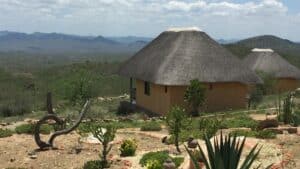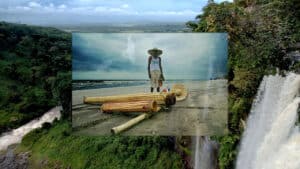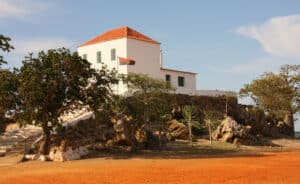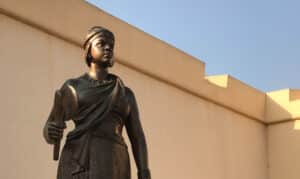
For the love of Angola (the African country, not the U.S. prison)
IQ
- 6 Min Read
In order to offer transparency into how our stories are produced and to teach our readers about the importance of media literacy online, the editorial team provides a quick self-rating of the integrity of the articles and the facts presented against the following IQ metrics.
- Published on December 1, 2022
- Last Updated March 17, 2023
Assigning editor Zuleide de Carvalho reflects on her home country of Angola in Africa as it celebrates its 47th Independence Day.
At numerous times I watched the sunset at Praia Morena in Benguela, Angola. It’s called “the golden hour” for a reason. It is the moment the sun descends to give the ocean its final kiss of the day, when the warm breeze loses the undertones of its heat and the waves soften into delicate foam on the shore that we, as Angolans, sometimes take for granted the magnitude of its beauty, and it overwhelms us.

What’s not to love about Angola? Truth be told, there’s a lot. But today, I decided to focus on some of the goodness that we, as a proud African (predominantly Black) nation, embody and enjoy sharing with an enthusiastic traveler.
But first, a proper Angolan complaint: Could I be the only person thinking that it’s borderline offensive for the United States of America to name its largest maximum-security prison the name of my beloved country?! Anyways…
In this essay, I write about some of Angola’s finest qualities and the ways our culture symbolizes resilience, even in the face of some of life’s greatest obstacles.
A culture built on resilience
As my country puts a seal on its 47th Independence anniversary this month,this month, if I had to pick three aspects I love most about Angola, it would be the incommensurable ability of our people — especially our children — to smile with their eyes. Though not in the glamorous, confident and sexy way the American icon Tyra Banks has fiercely taught the world, Angolan children smile with their eyes in a fashion that touches your heart. They smile in a way that, without the need of accompanying words, can make you rethink your priorities and expand your soul.
This year alone 3.9 million children face food insecurity in Angola due to the consequences of climate change, according to UNICEF’s latest report. Yet, hundreds of thousands of Angolan children smile with all their beings even after they have walked 4.4 miles or more, for over an hour and well before sunrise, with the company of only their loud, empty stomachs, to get to school. Many won’t have had breakfast and perhaps also dinner.
Some of them will be barefoot, sporting the slimmest, half-eaten-by-time and not-ergonomic-at-all flats and wearing clothes that had changed colors as a result of not seeing water and soap in months. Some children carry with them wounds of abuse, and some pick up this journey after a night of labor. All of them, however, walk forward with the same goal: To make sure they arrive at school at least a couple of minutes prior to 8 a.m., invested in learning and earning a better future than that of their parents.

And then at noon, with indubitably emptier stomachs and sometimes brighter smiles, they walk all the way back home for their first (and sometimes only) meal of the day: lunch, after which they get ready for their remaining daily duties. Still, throughout the day, glimpses of that ability to smile with their eyes is evident yet again — an act of resilience in its most beautiful form.
Exploring Angolan beauty through nature
Another side I wholeheartedly love about Angola is its natural beauty. I firmly believe that our country is the most blessed extension of land in the universe.

Angola has its own seven wonders: Fenda da Tundavala (Tundavala’s Gap), Floresta do Maiombe (Maiombe’s Forest), Grutas do Nzenzo (Nzenzo’s Caves), Lagoa Carumbo (Carumbo Lake), Morro do Môco (Môco’s Hill), Quedas de Kalandula (Kalandula’s Waterfalls) and Quedas do Rio Chiumbe (Chiumbe’s River Waterfalls). Yet, these attractions are only a fraction of our enchanted whole, representing only locations some of our people voted for on the natural wonders’ national awards contest, back in the early 2010s.
It hurts me to acknowledge that out of those seven, I’ve only been to one of our natural national wonders: Quedas de Kalandula. It wasn’t on purpose, as local tourism has a tricky history in my country. Well, it’s simply acutely expensive. This is not the case for foreigners, though, which makes these sites widely accessible for most folks who travel to Angola.
Quedas de Kalandula, the second highest waterfall in Africa, is found in Malanje, Angola. The falls remain my favorite no matter what, despite the fact that I’ve never seen our other wonders. My father was born in that province and as such, he never misses a chance to teach Malanje’s traditions to our family’s younger generations. At countless family gatherings he teaches us about honor, having the utmost respect for elders, pride in our identity, hard work, intelligence and of course, he always makes room for Malanje’s flair, including jokes about its natives — like himself.

The one time I was lucky enough to visit Quedas de Kalandula was in December of 2014. Today, I still remember my Facebook quote about it, which reads: “I don’t know how to describe what I felt when I got there, nor while my stay endured. Happiness, tranquility, hope, perhaps!? No, it was a lot more than that! Thank you, Dad, for taking me to meet this stunning place, which stands imperious in the land of our ancestors. It was even more special for being able to share this moment with you.”
Of course, I also remember how it felt to be there — not just my post — even if I still can’t find the words to describe it.
Semba: Not just any old art form
And then there’s the music. Within the whole musical arts dimension around the world, there’s truly nothing like Semba. O país que nasceu meu pai, one of the songs of the Semba prince himself, Paulo Flores, will for eternity remain one of the most eloquent and meaningful songs born from this Angolan genre: to me and, quite frankly, to our nation.

Our national heirloom, Semba, is a musical genre that effortlessly makes its way into each and every Angolan heart — and Will Smith’s, too. Whether singers are outspoken about political cruelties and schemes, social injustice, economic crisis, human loss, joy, parties, ancestors, or, of course, romantic love, the mix of the melody, based on a guitar sound proudly typical of conga, dikanza, marimba and other handmade instruments, Semba is our recipe for healing, and heal it does — no matter how unbearable the loss might be.
Through Semba, musicians have also paid homage to our country as an independent nation. Angola first celebrated its independence day on Nov. 11, 1975. As a 31-year-old woman, it still shocks me to acknowledge that some of my dearest friends are basically the same age as our freed nation. Some are even older.
Angola was colonized by Portugal for around 500 years.Today, as I reflect on what my country’s independence means, my thoughts take me back to Praia Morena’s sunset because the sea always brings me an unmatched sense of freedom. But, I guess that particular slice of the Atlantic Ocean will always be a double-edged sword as our ancestors departed in masses as enslaved people to Europe and the Americas, from that very same port.
Zuleide de Carvalho is an Angolan Fulbrighter taking the second year of her MA in broadcast journalism at University of Missouri-Columbia. She started her journalistic career close to 12 years ago. For six years Zuleide wrote news mostly about social issues, culture and arts, but economics and political pieces as well for newspaper O PAÍS. Her work was also found on print magazines Supernoite and Vida. She worked as Public Relations Officer for Luso-Angolan Dj Djeff, who plays on house-music world’s biggest stages. Zuleide is a passionate solo traveler and has been to 12 countries. A dreamer by default, she cares deeply about human rights, and has a degree in Human Resources Management. Zuleide grew up in Portugal, living there for eight years.
This story was originally published November 30, 2022 3:11 PM.




